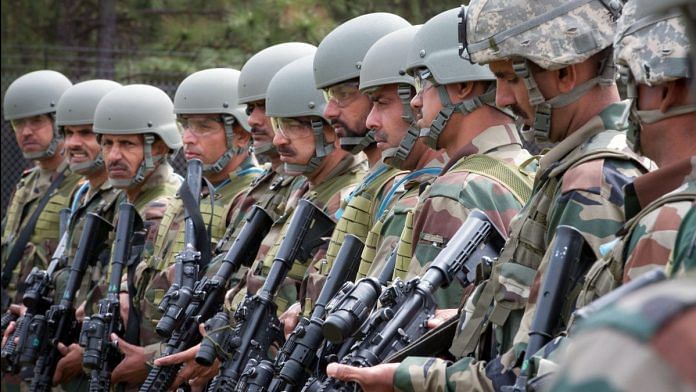The calculation that India can afford this brinkmanship is a costly gamble.
The Indian claim of carrying out a cross-LoC surgical military strike had left Pakistanis befuddled. There was no evidence substantiating the Indian boast of preventive strikes. Surely there had been escalation in exchange of fire between the two forces along the Line of Control, leaving many Pakistani soldiers dead.
However, there has not been any clear answer by Indian officials about where exactly the targeted militant camps, which were supposed to have been destroyed, were located. Instead, we got some grainy videos of the operation. Even that failed to clear doubts.
Initially, Indian officials indicated that helicopters were used in the surgical operations, but they soon backtracked saying there were no aerial strikes and the cross-LoC operation just involved ground troops. The Indian forces apparently launched attacks simultaneously on several positions and reportedly the fire was promptly countered by Pakistani troops.
Moreover, Indian military officials have not provided full details about the number of targets or the number of casualties, nor have they identified them. Undoubtedly, there is much ambiguity over what exactly the surgical strikes by the Indian forces achieved. But there is some indication that the Indian troops may have crossed the LOC at some point although it is not clear how far they penetrated.
Of course, incursion by the rival troops on both sides of the LoC is not unusual and there are some examples in the past. But the context and scale of last year’s infringement has completely changed the situation. While in the past, neither side would acknowledge an incursion, it was different when New Delhi publically owned the act of aggression. Pakistan’s response uncharacteristically has simply been to repudiate what it described as lies.
While trying to prove New Delhi’s claim wrong, perhaps Islamabad deliberately ignored the message behind the Indian belligerence. It is not important whether technically speaking it was a surgical strike or just an incursion. The real issue is that the Modi government has set a new and dangerous precedent signalling its willingness to go to the extreme in the event of any militant strike on its soil. It is what is described as Modi’s doctrine of aggressive diplomacy.
Surely, a major factor behind last year’s Indian incursion appears to be the growing public outcry following the militant attack on the Uri military camp in Kashmir. But some Pakistani security experts believe that the Indian claim of surgical strike was not just to address local sentiment; it was also meant to send a clear message to the international community about India’s new and more aggressive approach of what some analysts describe as a ‘vertical and horizontal escalation’ in dealing with Pakistan.
Pakistan’s response to Indian escalation has remained incoherent and patchy, reflecting the growing divergence between the military and the government of previous prime minister Nawaz Sharif.
The Indian claim of surgical strike and incessant firing on the LoC has certainly strengthened the hardliners in both the civilian government and the military leadership. Sharif found himself in a tight corner despite his desire to improve relations with New Delhi. His soft peddling on India is one on the factors souring his relations with the military leadership. Sharif’s ouster, often described a judicial coup, has further shrunk the possibility of Pakistan pursuing a softer position on India.
What has made things more complicated is Modi’s public show of support for the secessionist movement in Balochistan. There is a fear that the move could trigger a new round of sub-conventional warfare in the region with disastrous consequences for both countries. India’s move to use its strategic relations with the government in Kabul to increase pressure and encircle Pakistan is another issue worrying Pakistani civil and military leadership.
That has encouraged the hardliners to toughen their stance providing justification to revive support to anti-Indian militant groups. It could also have a negative effect on Pakistan’s ongoing campaign against militancy and violent extremism.
Pakistan has suffered from a lack of clear and coherent foreign and security policies because of multiple power centres. This has caused Islamabad huge diplomatic setbacks in recent years. But the illusion of international isolation Pakistan that some nations nurse does not seem plausible. India’s deepening strategic collaboration with Afghanistan and other regional countries could surely create some problems in the short term but it cannot bring Islamabad to its knees.
The underlying calculation that India can afford this brinkmanship given the country’s growing global influence is potentially a costly gamble. Such reckless action could easily spiral out of control and turn into a wider conflict. It is hard to believe that the international community has the same appetite for conflagration in one of the world’s most combustible regions. One year after the Indian claim of surgical strike, the relations between the two countries have not shown any sign of improvement even if they have not gone downward.
The writer is a journalist and author of ‘The Scorpion’s Tail: The relentless rise of Islamic militant in Pakistan and Frontline Pakistan’.
Also see:India shouldn’t hesitate to strike back at Pakistan if it has adequate evidence
Also see:What did India’s surgical strike against terrorists in Pakistan achieve?




It’s no longer same ??. Gen next born after independence think & perceive differently. Similar should be the view of present genre across. Not worth carrying excess baggage of legacy issues which spread bad blood, promote hatred & perpetuate poverty What options available against the stranglehold of ?? Army & Mullahs on the populace, whose very survival depends upon enmity with eastern neighbour. Some say time not yet ripe, well someone has to make it happen?